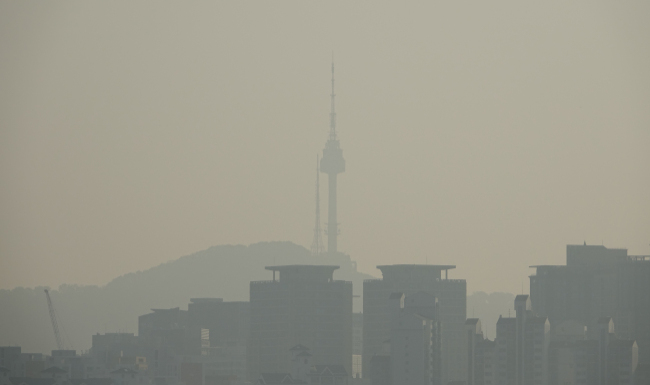South Korea’s environmental quality, particularly air quality, is among the worst in the Organization for Economic Cooperation and Development, according to its latest report.
 |
Seoul’s Namsan Tower is blanketed in thick smoke. (Yonhap) |
The report, titled “How’s Life,” pinpoints that Korea’s long-term unemployment rate also marks the lowest in the OECD, while labor market insecurity is also low. The country’s life expectancy at birth is high, at 82 years, but barely a third of people consider their health to be “good” or “very good,” the report found.
The biannual statistical report documents a wide range of well-being outcomes and how they vary over time, between population groups and across countries, it explained.
According to the report’s data, the annual exposure to particulate matter 2.5 air pollution on average -- ultrafine particles less than 2.5 micrometers in diameter -- increased by 4 percent between 2005 and 2013 to 27.9 micrograms per cubic meter in South Korea.
The figure is twice that of the OECD’s exposure to PM 2.5 air pollution on average, which marked 13.9 micrograms per cubic meter during the same period.
Poland, where manufacturing remains a vital part of local economies, came second to South Korea, with annual exposure to PM 2.5 air pollution on average marking 22.1 micrograms per cubic meter, followed by South Africa with 21.6 micrograms per cubic meter.
Iceland, Norway, New Zealand and Australia were cited as countries that have the best air quality, marking 3, 4.6, 4.9 and 5.2 micrograms per cubic meter, respectively.
The percentage of South Koreans satisfied with their local water quality has remained broadly stable over the past decade. However, the report highlighted the country’s urgency of ensuring the sustainable use of the ocean and marine resources.
The country’s sustainability of water resources allocated for person marked 1,500 cubic meters, the second lowest in the OECD following Israel, while the OECD average marked 9,100 cubic meters. The figure directly affects how many are able to use water resources.
On the plus side, the report highlighted a growing level of civic engagement in politics, following a period of political unrest in late 2016, reflecting a high voter turnout of 77.2 percent in the 2017 presidential election, while housing has also become more affordable since 2005.
By Bak Se-hwan (
sh@heraldcorp.com)





![[Weekender] Korea's traditional sauce culture gains global recognition](http://res.heraldm.com/phpwas/restmb_idxmake.php?idx=644&simg=/content/image/2024/11/21/20241121050153_0.jpg)


